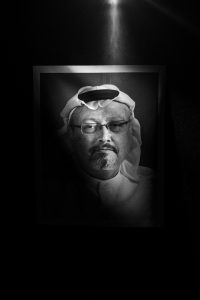In Memoriam
 At the end of the year Time Magazine selects a Person Of The Year. This time around Time chose a category of individual: the “guardians” for truth, that is four journalists who persisted in writing, in reporting truth at great cost to themselves, imprisonment and loss of their lives.
At the end of the year Time Magazine selects a Person Of The Year. This time around Time chose a category of individual: the “guardians” for truth, that is four journalists who persisted in writing, in reporting truth at great cost to themselves, imprisonment and loss of their lives.
One of the guardians for truth was Jamal Khashoggi. I was moved by the initial report of his death a few weeks ago. Here is what Time Magazine wrote about him.
Khashoggi put his faith in bearing witness. He put it in the field reporting he had done since youth, in the newspaper editorship he was forced out of and in the columns he wrote from lonely exile. “Must we choose,” he asked in the Washington Post in May, “between movie theaters and our rights as citizens to speak out, whether in support of or critical of our government’s actions?” Khashoggi had fled his homeland last year even though he actually supported much of Crown Prince Mohammed bin Salman’s agenda in Saudi Arabia. What irked the kingdom and marked the journalist for death was Khashoggi’s insistence on coming to that conclusion on his own, tempering it with troubling facts and trusting the public to think for itself.
Such independence is no small thing. It marks the distinction between tyranny and democracy. And in a world where budding authoritarians have advanced by blurring the difference, there was a clarity in the spectacle of a tyrant’s fury visited upon a man armed only with a pen. Because the strongmen of the world only look strong. All despots live in fear of their people. To see genuine strength, look to the spaces where individuals dare to describe what’s going on in front of them.
Khashoggi was a leading journalist in Saudi Arabia for decades before fleeing to the U.S. in 2017. In columns for the Washington Post, he criticized Crown Prince Mohammed bin Salman’s quest for total power and suppression of free speech. On Oct. 2, Khashoggi was murdered by agents of the kingdom inside its Istanbul consulate, while his fiancée waited for him outside.